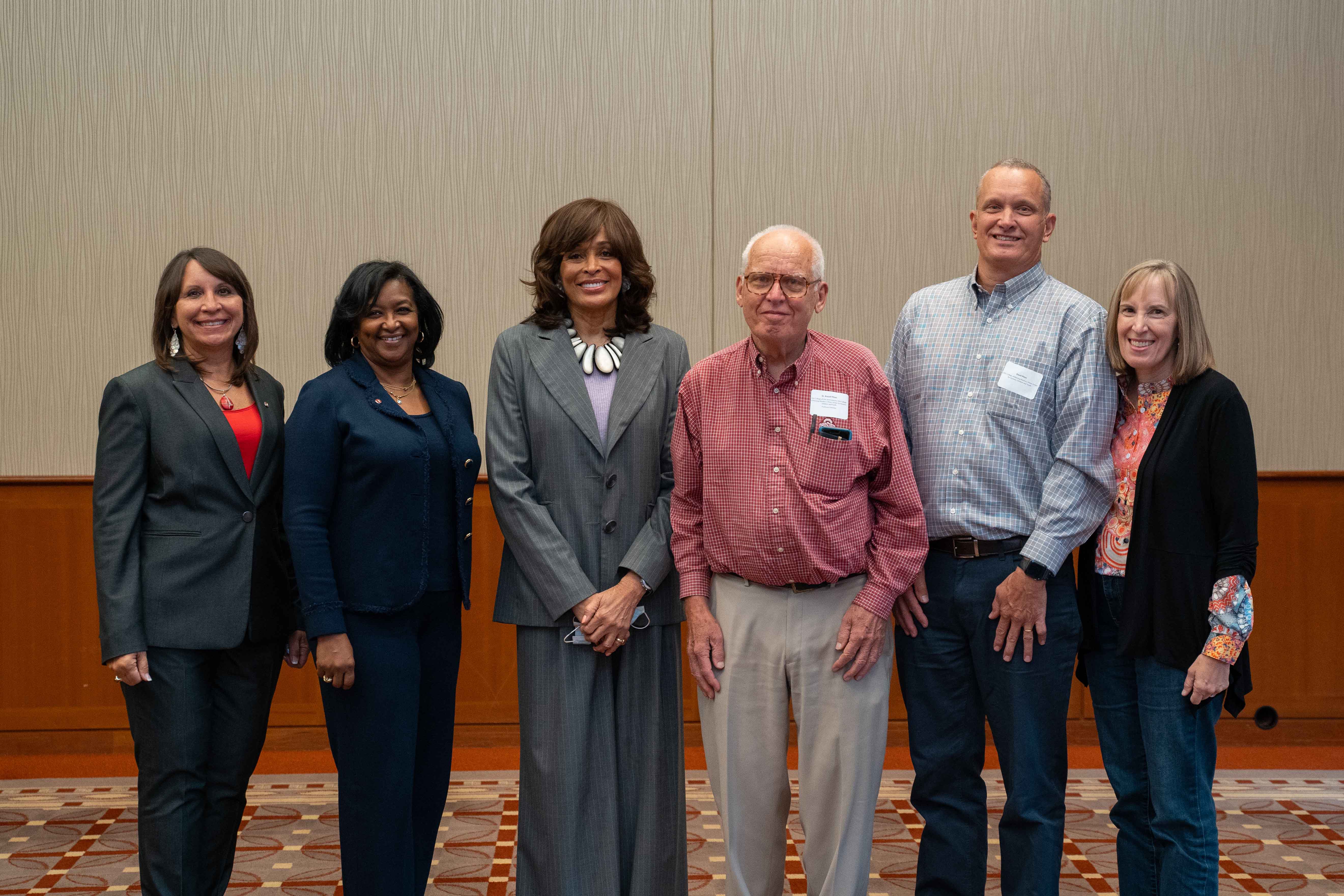
Faye Wattleton
Committed to women’s health
by Susan Neale
Faye Wattleton, MS, (’64), renowned advocate for women’s reproductive rights, was the first Black woman and youngest person ever to head the Planned Parenthood Federation of America. She is a College of Nursing alumna. Her honors include being inducted into the National Women’s Hall of Fame, receiving The Ohio State University Alumni Medalist Award for National and International Career Distinction, and recently being inducted into The Ohio State University Office of Diversity and Inclusion (ODI) Hall of Fame.
At the ODI Hall of Fame Induction ceremony, Ms. Wattleton expressed gratitude for the arrangement provided to nursing students by Neil Hall residency – free room and board in exchange for hospital work – that helped her afford her undergraduate education; for the professors who gave her insight and for the outlook she gained from Ohio State. “I would like to thank the institution for giving me a perspective, a way of looking at life and how I could apply what I had learned at Ohio State, “ she said, adding that at Ohio State, she gained a lot of courage. “And courage is a very important quality to sustain you throughout your life.”
"I have never believed in the impossible."
– Faye Wattleton
It could be argued that when she arrived at Ohio State, Wattleton already had a great deal of courage. Born in St. Louis, Missouri in 1943, she had often been moved to different states – from Ohio to Nebraska – and stationed with different families while her mother and father traveled for her mother’s career as a revivalist preacher. In the summers she would go to visit relatives in Mississippi, and remembers taking the train there by herself when she was only four and a half years old. In her autobiography, Life on the Line, Wattleton says, “The roots of my character can be found in the values of a family of doers, a family of independent thinkers with strong wills and convictions.” Her parents believed in their precocious daughter’s dream to be a nurse, and when she was sixteen, she boarded the Greyhound bus from Cleveland, where her mother led a Church of God congregation, for Ohio State.
Soon after graduating from Ohio State with a BSN, she set the goal of pursing a higher degree. Dr. Ethelrine Shaw at Ohio State advised her to pursue a program offering midwifery, which Shaw called, “the wave of the future.” Wattleton couldn’t afford graduate school, but she knew she would find a way. “From my earliest years I’d learned that obstacles were not impossibilities; they were simply meant to be overcome,” she said of her confidence at that time.

She taught at the Miami Valley Hospital School of Nursing in Dayton to save money for graduate school. Working there, she saw many unfortunate women suffering and even dying from substandard and illegal reproductive health practices. Her life’s mission began to take shape.
With a U.S. Public Health Service grant, a scholarship from United Methodist Women and sale of her beloved yellow Buick convertible, Wattleton headed to New York to attend Columbia University.
There, she earned a master’s degree in maternal and infant care with certification in midwifery, getting her clinical experience at Harlem Hospital. Then Wattleton returned to Dayton to be deputy in charge of the Visiting Nurses Association and maternal and child health programs at Dayton Department of Health. The opportunity to work in policy appealed to her as a way to help a greater number of people. “I was drawn to Dayton because of the possibility of influencing the services of an agency … I didn’t see it as a bold decision – it was just the next step for me after Harlem, as logical to me as my grandfather’s building a bus when he saw children walking to school one by one.”
In Dayton, she became an advocate for women’s reproductive health. “Like my mother, whom I’d watched prepare the text for her sermons, day in and day out,” Wattleton said, “I knew that nothing could substitute for thorough preparation: not emotion, but hard evidence.” Concerned about the high incidence of women delivering without prenatal care in Dayton, she led an initiative to create community health clinics for pregnant women who had no prenatal or postnatal care.
She became a board member of Miami Valley Planned Parenthood, and then its executive director in 1970. She was elected President of Planned Parenthood Federation of America in 1978 when she was 33 and became a tireless advocate for the nation’s largest and oldest reproductive health provider, serving in that role until 1992. Wattleton went on to host a TV talk show about women’s rights and formed the Center for the Advancement of Women, a non-profit think tank conducting research for public education and policy advocacy for women. She is now co-founder and director of EeroQ Quantum Computing.
We were honored to have Faye Wattleton give the 2021 Martha S. Pitzer Lecture at Ohio State in October.

The Martha S. Pitzer lecture
A gracious and inspiring speaker, Faye Wattleton began her lecture on women’s health with thanks for the education she received at Ohio State, and a reminder that the opportunity and privilege to learn at a great institution such as The Ohio State University carries with it “the obligation to give, and to pass that on.”
As we emerge from this time of pandemic, “the Martha S. Pitzer Center’s mission dedicated to translational research for innovation in healthcare for women, infants and youth will be needed now more than ever,” Wattleton said. “This is a pivotal moment when we have an opportunity to effect systemic change in our institutions and in our communities.”
She addressed issues threatening women’s health and safety as well as measures to mitigate them. “If women are not safe, how can we holistically assume that our communities will be safe?” she asked.
- Domestic partner abuse and sexual violence. 1 out of 3 women will experience domestic partner abuse in their lifetime. In 1994, the Violence Against Women Act did a great deal to advance services toward protecting women, including establishing crisis centers, counselling centers and shelters. It expired in 2018, stalled in the U.S. Senate. “It’s going no place at this point unless women and their supporters rise up and say, ‘We want to be protected from a violent and abusive existence.’ That shouldn’t be so hard for us to do.”
- Heart disease. Heart disease is the #1 killer of women, accounting for 27% of female deaths. So much of heart disease is preventable, and the Affordable Care Act did much to help underserved women fight heart disease. “Emerging from the pandemic, it’s really important for us to address the Affordable Care Act and its preservation,” Wattleton asserted.
- Death from maternal related issues is a complex issue, she said. The root causes are multiple. A mother’s healthcare doesn’t start with the first prenatal exam; rather, “It starts with the first day of that woman’s life and should carry through to advancement of her health and wellness.” We must “make a commitment to improve health and wellness as a lifelong pursuit, not an incidental pursuit.”
- Reproductive rights. Wattleton, who spent her professional career in the realm of reproductive control and reproductive health, expressed grave concern about the state of women’s reproductive rights in our nation today. “We, each of us, should look in the mirror and take responsibility for where we are on reproductive rights,” she said.
Women’s reproductive rights have a long history in our country. The Roe v. Wade decision almost 50 years ago came after years of judicial decisions regarding women’s reproductive control. “When I started the work at Planned Parenthood [in the mid-60s], contraception among married couples had just been declared protected by the Supreme Court,” Wattleton pointed out. Roe v. Wade was decided in the early 70s. Laws restricting funding and access, often affecting poor women the most, began in 1975. “Thereafter, we have seen a gradual erosion that has been allowed to perpetuate over the years,” Wattleton said. Today, over 45 states have passed restrictive legislation to limit women’s reproductive rights.
Summary
Wattleton urged her listeners to take part in the political process and be persistent advocates for women. “The pandemic has shaken this nation and this world,” she said, but It has also opened the possibility to talk about disease disparities openly and compassionately. It is much harder to change attitudes than laws, Wattleton added, and advocacy is a lifelong journey. “So, the question is, what do you sign up for? What are you committed to do?”
“I urge you to join in the way that you can, to seek beyond your day to day work … as to how you can contribute and use what you’ve been given for a larger and greater societal goal,” she concluded, then stated her life’s goal simply: “I have dedicated myself to women.”
In this issue
- Diane Von Ah: Solving Cancer Care Puzzles
- Faye Wattleton: Committed to Women's Health
- Amanda Parker: Finding the Light Within
- Publications with Passion
- New Grants Roundup
- Building Update
- Advancing EBP: Clinicians Dare to Dream
- Bridge Care: Denise Williams
- Student Mental Health Initiatives
- Student Life: Back to Campus
- Health Equity Scholars
- Young Alumni Blog
- Homecoming
- Connie Gallaher: Paying it Forward
- Virtual Trails
